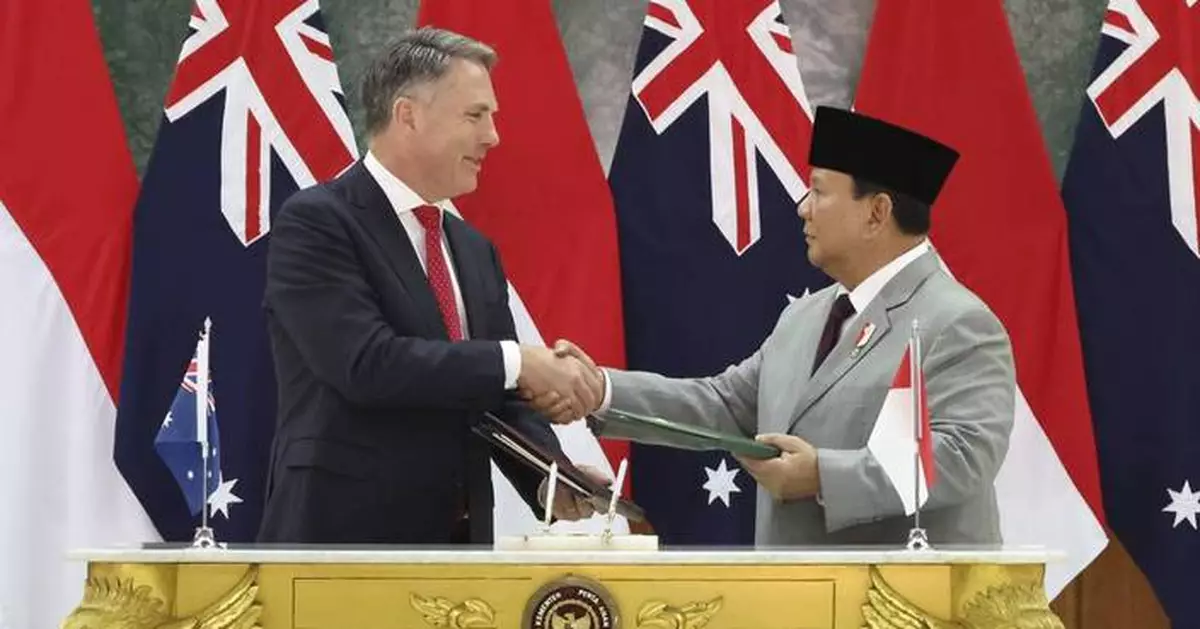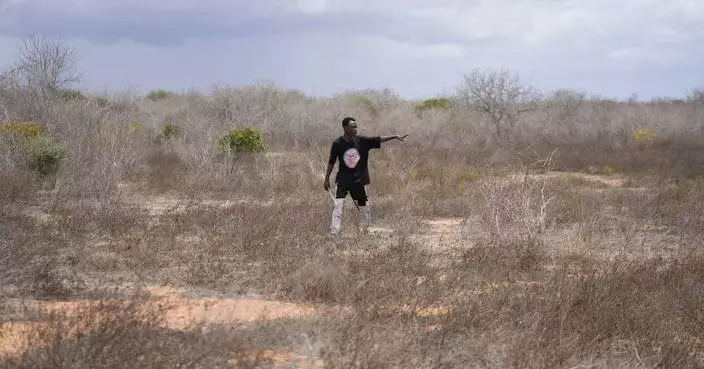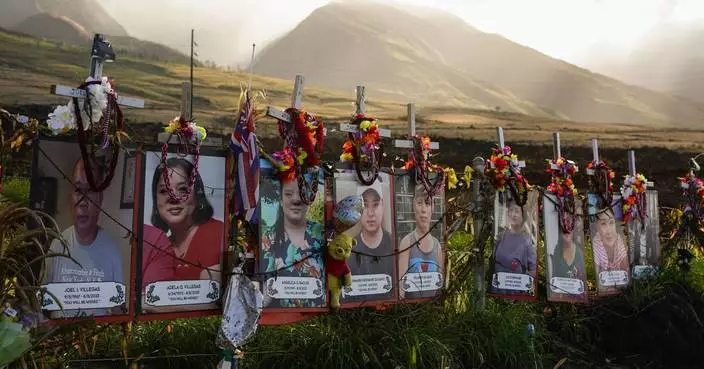JAKARTA, Indonesia (AP) — Indonesia and Australia signed a defense agreement on Thursday that both sides described as a significant upgrade to their military relationship.
Indonesia’s president-elect Prabowo Subianto, who also serves as defense minister, signed the Defense Cooperation Agreement with Australian Defense Minister Richard Marles at Indonesia’s National Military Academy in Magelang, Central Java province.
Marles said the agreement, whose text has not been published, is "an important piece of international architecture, a treaty-level agreement” but not a military alliance. He added that the two countries plan to hold the largest joint military exercise in their history in November, which will be Australia's largest overseas exercise of the year.
The bilateral relationship is becoming increasingly important to Australia in face of growing tensions with China in the region. New Australian prime ministers typically make Jakarta one of their first overseas destinations.
Subianto has vowed to continue Indonesia’s long-standing policy of non-alignment as president.
“We did it to work together, as neighbors who are in direct contact, to increase cooperation to help each other overcome various security threats and promote sustainable peace and stability in the Asia Pacific region,” Subianto said on Thursday.
Australia's defense ministry said that the agreement will include “enhanced practical cooperation and interoperability between our defence forces in areas such as maritime security, counter terrorism, humanitarian and disaster relief, logistics support, education and training, as well as across defence industry.”
“The defense cooperation agreement between our two nations is the deepest. It’s the the most significant defense agreement in the history of our bilateral relationship,” Marles said on Thursday.
Indonesia's Defense Ministry said that the agreement that would help prevent future security threats in the Asia-Pacific region through collaborative efforts to maintain peace and stability.
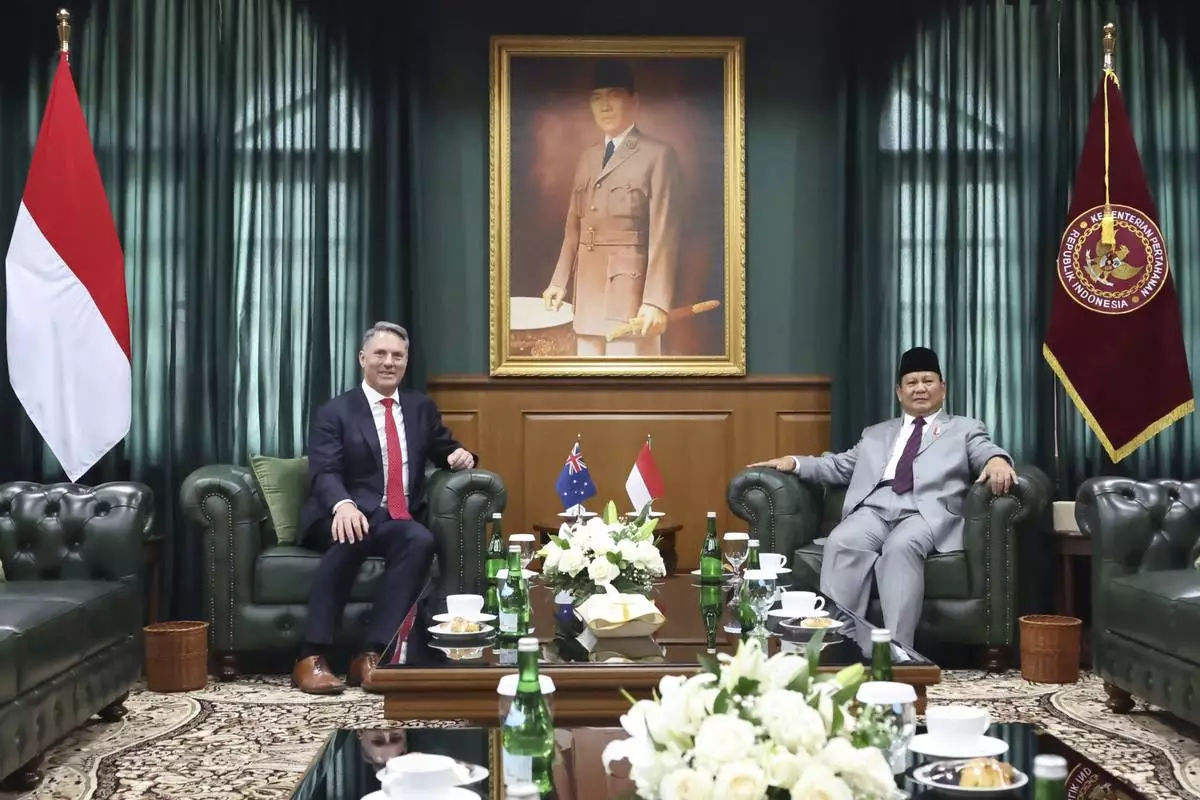
In this photo released by Indonesia's Ministry of Defense, Australia's Deputy Prime Minister and Defense Minister Richard Marles, left, meets with Indonesian Defense Minister Prabowo Subianto at the Military Academy in Magelang, Central Java, Indonesia, Thursday, Aug. 29, 2024. (Indonesian Ministry of Defense via AP)
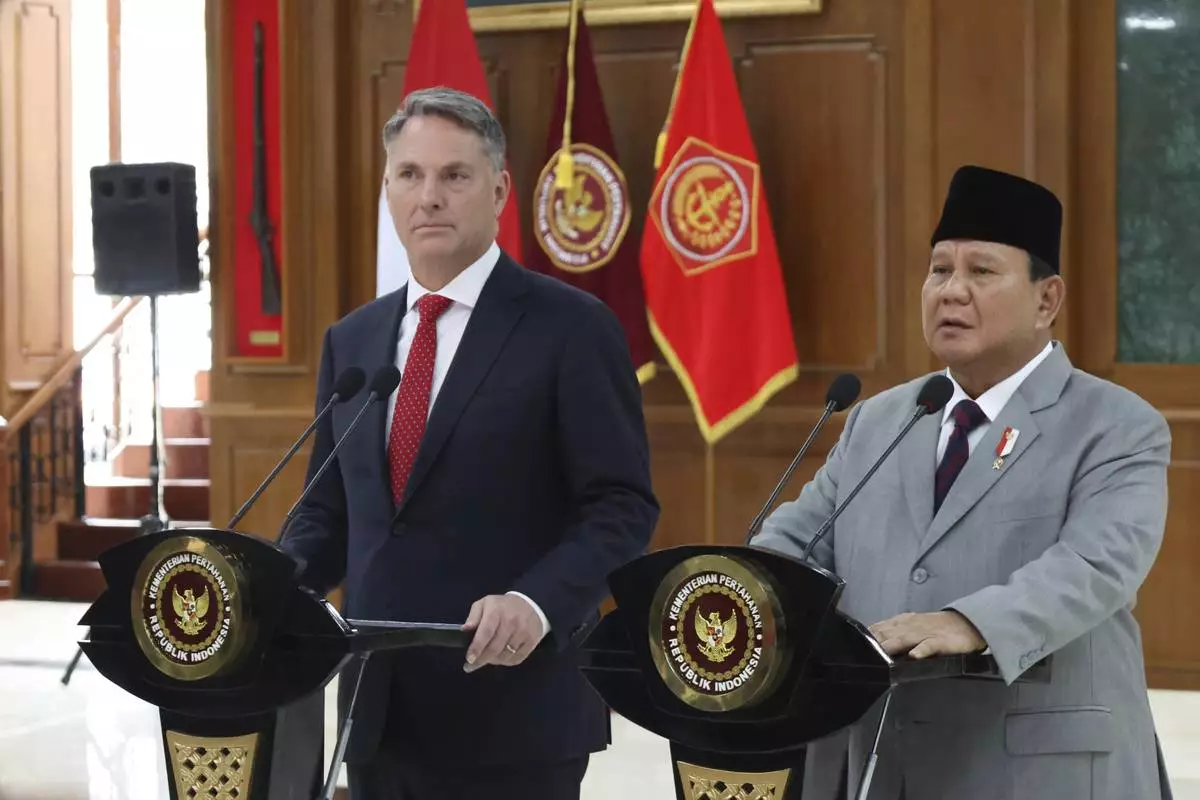
In this photo released by Indonesia's Ministry of Defense, Australia's Deputy Prime Minister and Defense Minister Richard Marles, left, and Indonesian Defense Minister Prabowo Subianto speak to the media during a press conference after their meeting at the Military Academy in Magelang, Central Java, Indonesia, Thursday, Aug. 29, 2024. (Indonesian Ministry of Defense via AP)
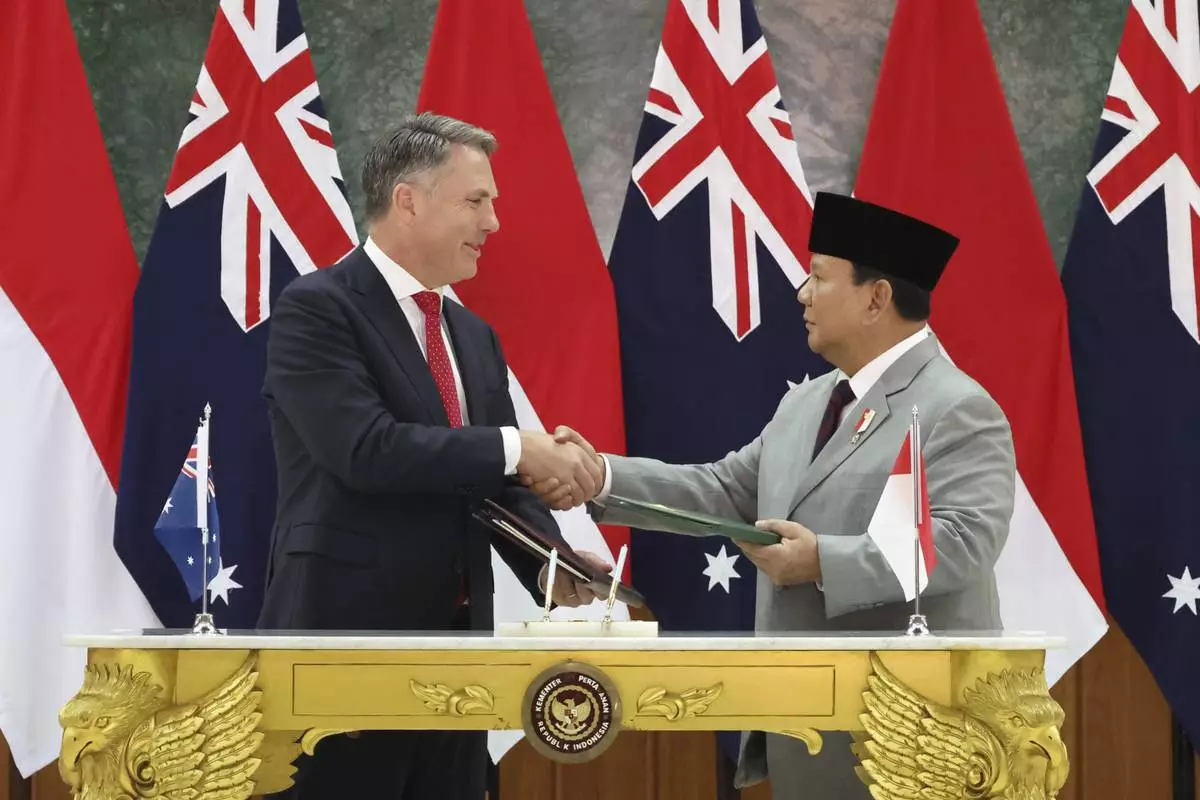
In this photo released by Indonesia's Ministry of Defense, Australia's Deputy Prime Minister and Defense Minister Richard Marles, left, shakes hands with Indonesian Defense Minister Prabowo Subianto during their meeting at the Military Academy in Magelang, Central Java, Indonesia, Thursday, Aug. 29, 2024. (Indonesian Ministry of Defense via AP)
In one of the deadliest cult-related massacres ever, the remains of more than 430 victims have been recovered since police raided Good News International Church in a forest some 70 kilometers (40 miles) inland from the Kenyan coastal town of Malindi.
Seventeen months later, many in the area are still shaken by what happened despite repeated warnings about the church’s leader.
Autopsies on more than 100 bodies showed deaths from starvation, strangulation, suffocation, and injuries sustained from blunt objects. A gravedigger, Shukran Karisa Mangi, said he believed more mass graves were yet to be discovered. At least 600 people are reported missing, according to the Kenya Red Cross.
Here are some details about the case.
The evangelical leader of Good News, Paul Mackenzie, is accused of instructing his followers to starve to death for the opportunity to meet Jesus. Mackenzie pleaded not guilty to charges in the murders of 191 children, multiple counts of manslaughter and other crimes. If convicted, he would spend the rest of his life in prison.
Some in Malindi who spoke to The Associated Press said Mackenzie’s confidence while in custody showed the wide-ranging power some evangelists project even as their teachings undermine government authority, break the law, or harm followers desperate for healing and other miracles.
It’s not only Mackenzie, said Thomas Kakala, a self-described bishop with the Malindi-based Jesus Cares Ministry International, referring to questionable pastors he knew in the capital Nairobi. “You look at them. If you are sober and you want to hear the word of God, you wouldn’t go to their church. But the place is packed.”
A man like Mackenzie, who refused to join the fellowship of pastors in Malindi and rarely quoted Scripture, could thrive in a country like Kenya, said Kakala. Six detectives have been suspended for ignoring multiple warnings about Mackenzie’s illegal activities.
Kakala said he felt discouraged in his attempts to discredit Mackenzie years ago. The evangelist had played a tape of Kakala on his TV station and declared him an enemy. Kakala felt threatened.
Mackenzie, a former street vendor and cab driver with a high-school education, apprenticed with a Malindi preacher in the late 1990s. There, in the laid-back tourist town, he opened his own church in 2003.
A charismatic preacher, he was said to perform miracles and exorcisms, and could be generous with his money. His followers included teachers and police officers. They came to Malindi from across Kenya, giving Mackenzie national prominence that spread the pain of the deaths across the country.
The first complaints against Mackenzie concerned his opposition to formal schooling and vaccination. He was briefly detained in 2019 for opposing the government’s efforts to assign national identification numbers to Kenyans, saying the numbers were satanic.
He closed his Malindi church premises later that year and urged his congregation to follow him to Shakahola, where he leased 800 acres of forest inhabited by elephants and big cats.
Church members paid small sums to own plots in Shakahola. They were required to build houses and live in villages with biblical names like Nazareth, according to survivors. They said Mackenzie grew more demanding, with people from different villages forbidden from communicating or gathering.
During the COVID-19 pandemic, which witnesses said strengthened Mackenzie’s vision of the end times, the leader ordered more rigorous fasting that became even more stringent by the end of 2022. Parents were forbidden from feeding their children, witnesses said.
Like much of East Africa, Kenya is dominated by Christians. While many are Anglican or Catholic, evangelical Christianity has been spreading widely since the 1980s. Many pastors style their ministries in the manner of successful U.S. televangelists, investing in broadcasting and advertising.
Many of Africa’s evangelical churches are run like sole proprietorships, without the guidance of trustee boards or laity. Pastors are often unaccountable, deriving authority from their perceived ability to perform miracles or make prophecies. Some, like Mackenzie, can seem all-powerful.
Associated Press religion coverage receives support through the AP’s collaboration with The Conversation US, with funding from Lilly Endowment Inc. The AP is solely responsible for this content.
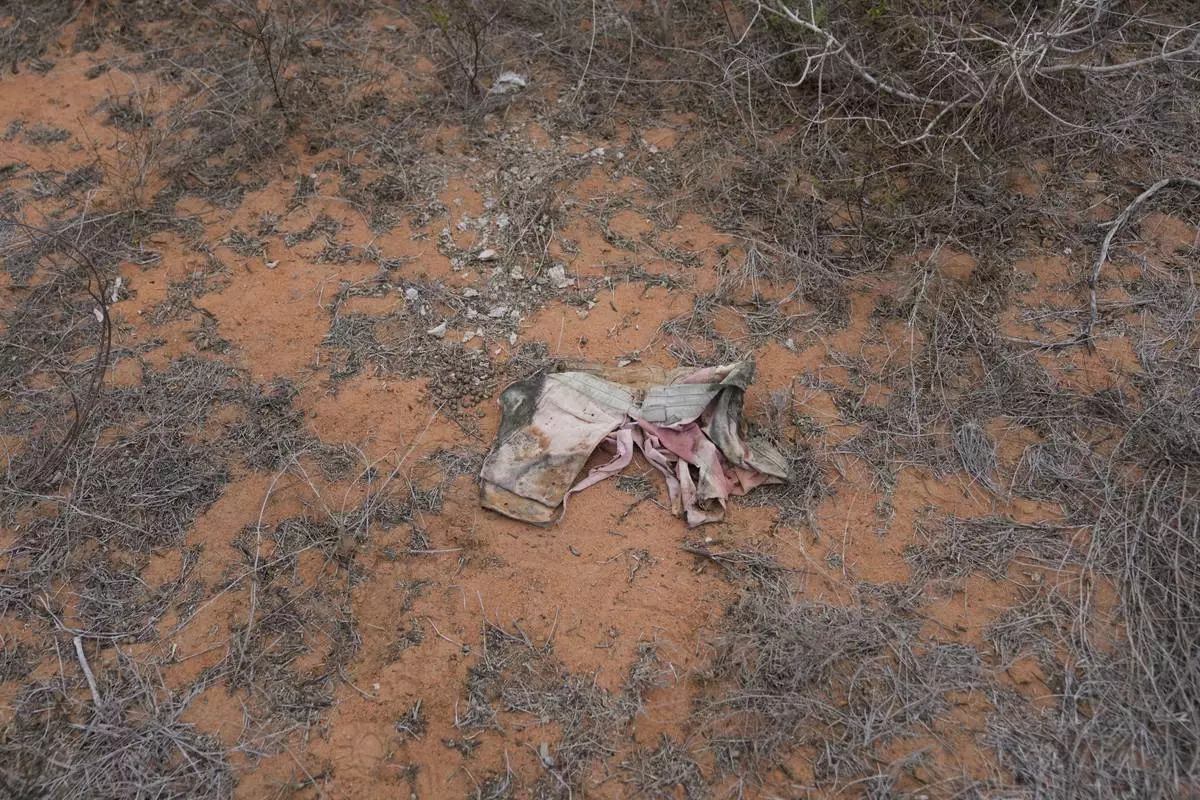
A piece of clothing lies in the bush near the forest where dozens of bodies were found in shallow graves in the village of Shakahola, near the coastal city of Malindi, in southern Kenya, on Thursday, Sept. 5, 2024. (AP Photo/Brian Inganga)





